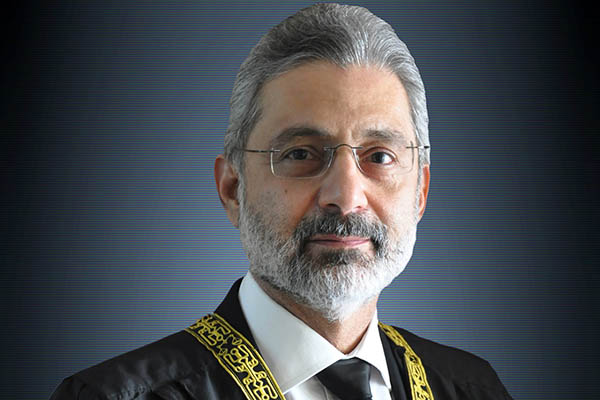
Supreme Court of Pakistan
Supreme Court Justice Qazi Faez Isa this week urged Chief Justice of Pakistan (CJP) Umar Ata Bandial not to “ridicule” the Judicial Commission of Pakistan (JCP) and proposed nominees to the apex court by contravening the Constitution.
“Restricting the JCP to consider only the CJ’s pre-selected nominees is inappropriate,” he wrote in a letter to all members of the JCP that laid out all his concerns with the manner in which the judicial body had been summoned to consider the elevation of high court judges to the top court.
Describing as “surprising” the summoning of the JCP to appoint five judges to the Supreme Court during summer vacations, Justice Isa said he had been informed of the meeting through a WhatsApp message sent by the additional registrar of the Supreme Court. “When availing of annual leave no meeting of the JCP was scheduled but as soon as I left Pakistan the CJP decided to hold two meetings of the JCP to consider appointments to the Sindh and Lahore High Courts, and now a third unscheduled meeting of the JCP is to be held during the summer vacations of the SC,” he said, noting that the vacation schedule was notified by the CJP himself. “If the CJP renders his own notification utterly meaningless then let him first withdraw it, instead of violating it,” he wrote.
Recalling that everyone—apart from the CJP and Justice Ijazul Ahsan—had voted to postpone the JCP meeting held on June 28 because there was no justification to call it during the gazetted summer vacations while the senior-most judge was on sanctioned annual leave, he said the CJP could not reject the body’s decisions. “In calling another meeting during notified-gazetted vacations, when some members are on annual leave, and at a time when the attorney-general is recovering from the second surgery he has recently undergone, is unjustified,” he said.
“The democratically taken decision by the JCP not to meet in such circumstances must be abided by. Democracy is the bedrock of the Constitution and the basis on which Pakistan came into existence,” he stressed, adding that the meeting could be deferred until Aug. 13 when he would return to office. “It [summoning of meeting] suggests that the CJP does not want me to be physically present, which is illegal and unconstitutional,” he said, adding that no meetings had been scheduled when the vacancies occurred. “To appoint five judges means more than a third of the SC, which the CJP wants to pack during notified-gazetted vacations, and by avoiding the participation of all members,” he said.
The senior judge also alleged that the CJP wanted to fill an “anticipated” vacancy on the retirement of Justice Sajjad Ali Shah, stressing Article 175(8) of the Constitution did not permit this. Nor did the Constitution, he wrote, permit the CJP to alone propose names, as this was the prerogative of the JCP. Allowing Justice Shah to choose his own successor is unconstitutional, he said. “Pakistan is not a kingdom of yore in which kings decided their successors. If this is permitted then the CJP may next call a meeting of the JCP to fill-in ‘anticipated vacancies’ that will occur in respect of all the judges of the SC, including those retiring after him,” he added.
Emphasizing that appointing judges to the superior courts required utmost care and due deliberation, he urged the CJP not to ridicule the process by contravening the Constitution. “Restricting the JCP to consider only the CJ’s pre-selected nominees is inappropriate. The JCP deserves to be treated with respect and consideration by its chairman,” he wrote.
The letter said the CJP had “admitted” to acting unfairly by saying he had arbitrarily considered only a certain number of judges for elevation to the SC. According to Justice Isa, the CJP said he considered three judges from Peshawar, six from Lahore and 12 from Sindh. This was unreasonable, he said, as the Lahore High Court is a much larger than the Sindh High Court and there was no process of proportion. Similarly, he wrote, the CJP was being discriminating by excluding from consideration the chief justice and judges of the Balochistan High Court and Islamabad High Court. “The prevailing sense of deprivation of the peoples of these areas is being further aggravated. With utmost respect, it appears that CJP has resorted to reverse engineering by first deciding who all to nominate and then find some pretext to justify his nominations,” he said, adding that all appointments should be in accordance with the Constitution, “on the basis of a predetermined and non-discriminatory criteria.” Above all else, he stressed, there should be no impression of favouritism.
“The Constitution does not grant the CJP any powers additional to those of the other members of the JCP; the CJP is only designated as the Chairman of the JCP,” he added.
